Operations Management Report: NZOFL's Global Expansion Strategies
VerifiedAdded on 2023/01/19
|8
|3108
|30
Report
AI Summary
This report delves into the operations management strategies of NZ Organic Food Limited (NZOFL), a New Zealand-based company aiming for overseas expansion. The report explores key aspects such as location strategy, focusing on potential sites like London and Mumbai, considering factors like GDP, population, purchasing power, and supply chain conditions. It also examines the four key success factors (KSFs) for NZOFL's competitive advantage: profit generation through various distribution channels, talent acquisition, capital acquisition through stock exchange listings, and technological advancement. Furthermore, the report analyzes inventory management, advocating for waste elimination, variability removal, and throughput improvement. Lastly, it addresses the concept of quality, discussing prevention, appraisal, internal, and external failure costs, while also suggesting the implementation of Just-in-time and other quality control methods.
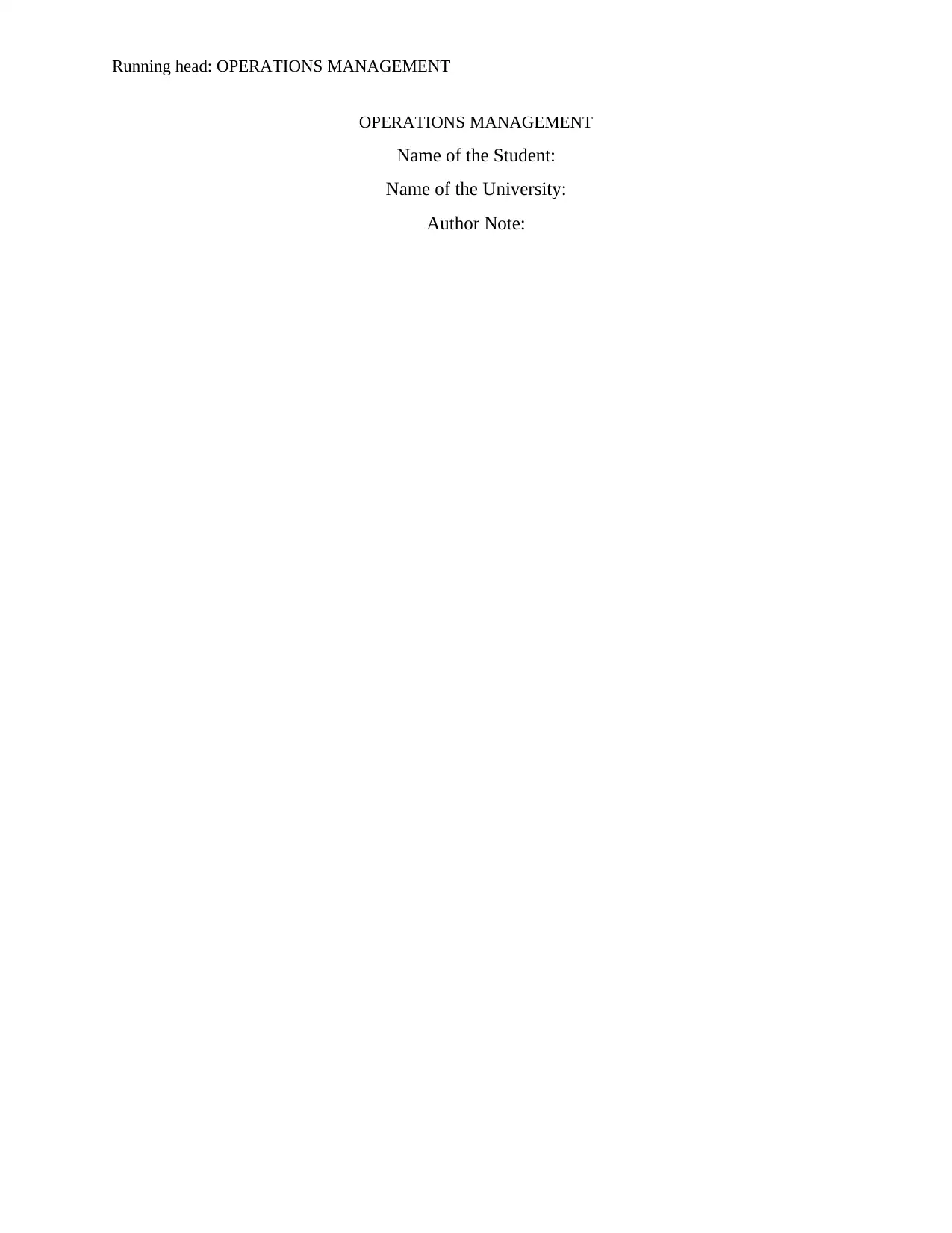
Running head: OPERATIONS MANAGEMENT
OPERATIONS MANAGEMENT
Name of the Student:
Name of the University:
Author Note:
OPERATIONS MANAGEMENT
Name of the Student:
Name of the University:
Author Note:
Paraphrase This Document
Need a fresh take? Get an instant paraphrase of this document with our AI Paraphraser
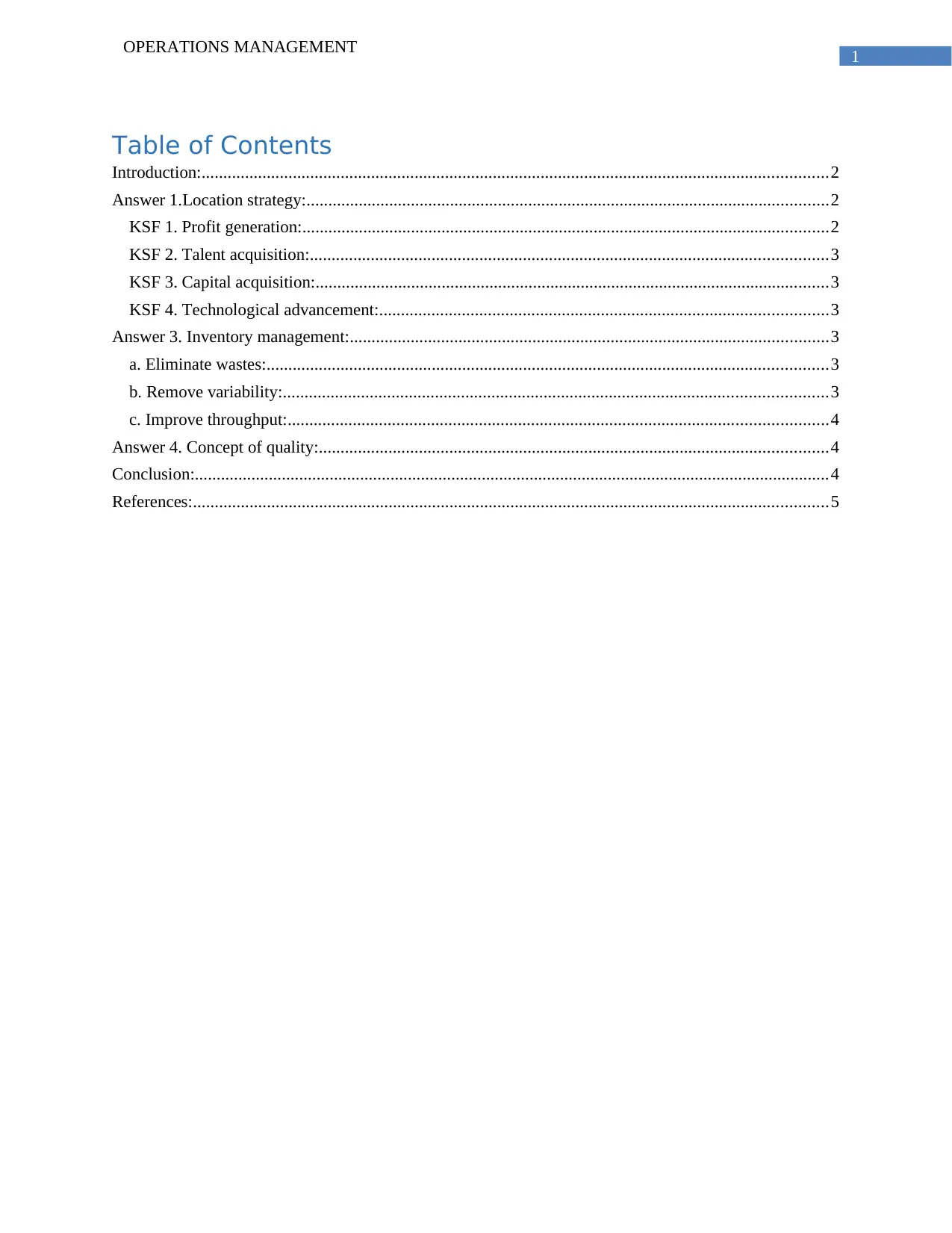
1
OPERATIONS MANAGEMENT
Table of Contents
Introduction:................................................................................................................................................2
Answer 1.Location strategy:........................................................................................................................2
KSF 1. Profit generation:.........................................................................................................................2
KSF 2. Talent acquisition:.......................................................................................................................3
KSF 3. Capital acquisition:......................................................................................................................3
KSF 4. Technological advancement:.......................................................................................................3
Answer 3. Inventory management:..............................................................................................................3
a. Eliminate wastes:.................................................................................................................................3
b. Remove variability:.............................................................................................................................3
c. Improve throughput:............................................................................................................................4
Answer 4. Concept of quality:.....................................................................................................................4
Conclusion:..................................................................................................................................................4
References:..................................................................................................................................................5
OPERATIONS MANAGEMENT
Table of Contents
Introduction:................................................................................................................................................2
Answer 1.Location strategy:........................................................................................................................2
KSF 1. Profit generation:.........................................................................................................................2
KSF 2. Talent acquisition:.......................................................................................................................3
KSF 3. Capital acquisition:......................................................................................................................3
KSF 4. Technological advancement:.......................................................................................................3
Answer 3. Inventory management:..............................................................................................................3
a. Eliminate wastes:.................................................................................................................................3
b. Remove variability:.............................................................................................................................3
c. Improve throughput:............................................................................................................................4
Answer 4. Concept of quality:.....................................................................................................................4
Conclusion:..................................................................................................................................................4
References:..................................................................................................................................................5
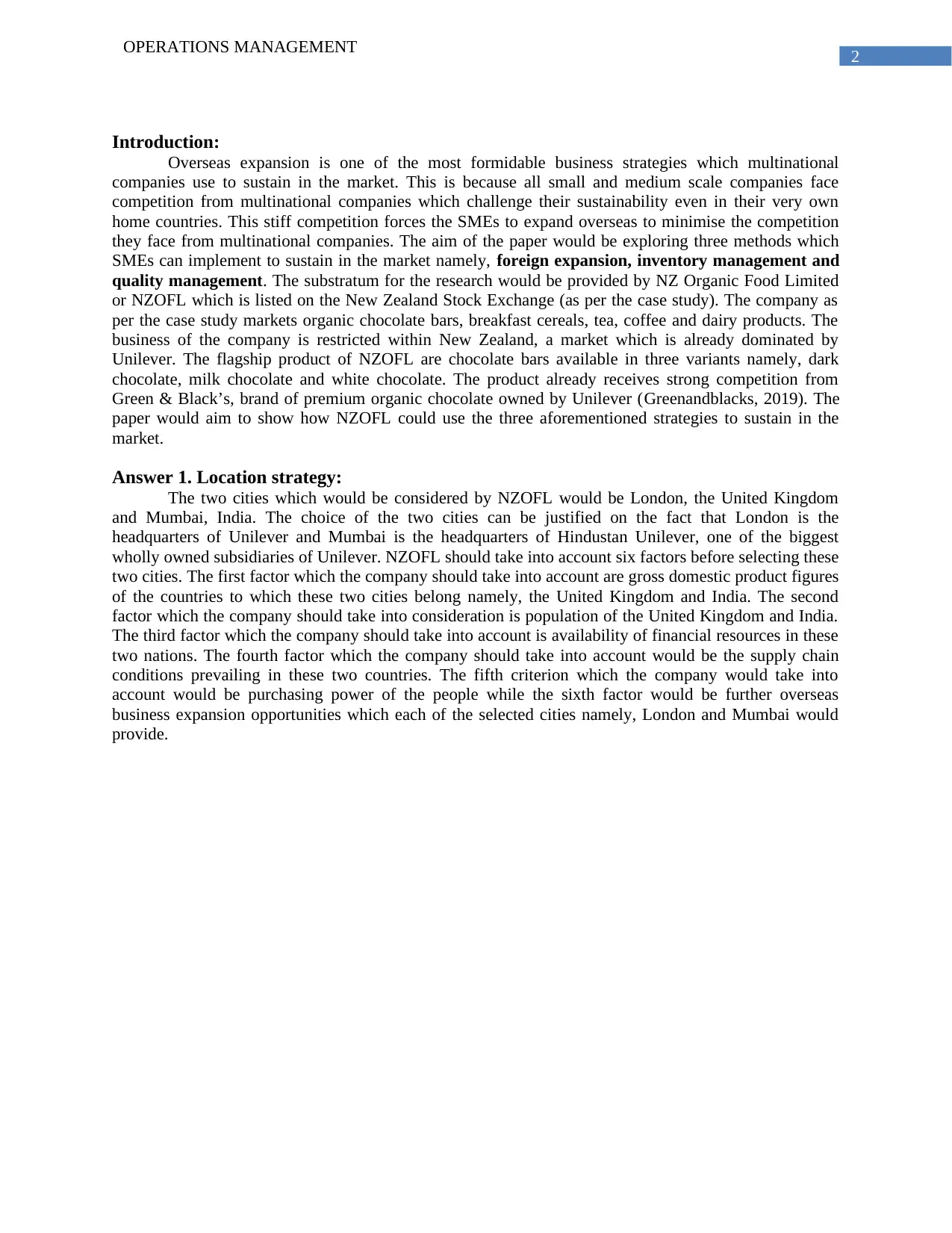
2
OPERATIONS MANAGEMENT
Introduction:
Overseas expansion is one of the most formidable business strategies which multinational
companies use to sustain in the market. This is because all small and medium scale companies face
competition from multinational companies which challenge their sustainability even in their very own
home countries. This stiff competition forces the SMEs to expand overseas to minimise the competition
they face from multinational companies. The aim of the paper would be exploring three methods which
SMEs can implement to sustain in the market namely, foreign expansion, inventory management and
quality management. The substratum for the research would be provided by NZ Organic Food Limited
or NZOFL which is listed on the New Zealand Stock Exchange (as per the case study). The company as
per the case study markets organic chocolate bars, breakfast cereals, tea, coffee and dairy products. The
business of the company is restricted within New Zealand, a market which is already dominated by
Unilever. The flagship product of NZOFL are chocolate bars available in three variants namely, dark
chocolate, milk chocolate and white chocolate. The product already receives strong competition from
Green & Black’s, brand of premium organic chocolate owned by Unilever (Greenandblacks, 2019). The
paper would aim to show how NZOFL could use the three aforementioned strategies to sustain in the
market.
Answer 1. Location strategy:
The two cities which would be considered by NZOFL would be London, the United Kingdom
and Mumbai, India. The choice of the two cities can be justified on the fact that London is the
headquarters of Unilever and Mumbai is the headquarters of Hindustan Unilever, one of the biggest
wholly owned subsidiaries of Unilever. NZOFL should take into account six factors before selecting these
two cities. The first factor which the company should take into account are gross domestic product figures
of the countries to which these two cities belong namely, the United Kingdom and India. The second
factor which the company should take into consideration is population of the United Kingdom and India.
The third factor which the company should take into account is availability of financial resources in these
two nations. The fourth factor which the company should take into account would be the supply chain
conditions prevailing in these two countries. The fifth criterion which the company would take into
account would be purchasing power of the people while the sixth factor would be further overseas
business expansion opportunities which each of the selected cities namely, London and Mumbai would
provide.
OPERATIONS MANAGEMENT
Introduction:
Overseas expansion is one of the most formidable business strategies which multinational
companies use to sustain in the market. This is because all small and medium scale companies face
competition from multinational companies which challenge their sustainability even in their very own
home countries. This stiff competition forces the SMEs to expand overseas to minimise the competition
they face from multinational companies. The aim of the paper would be exploring three methods which
SMEs can implement to sustain in the market namely, foreign expansion, inventory management and
quality management. The substratum for the research would be provided by NZ Organic Food Limited
or NZOFL which is listed on the New Zealand Stock Exchange (as per the case study). The company as
per the case study markets organic chocolate bars, breakfast cereals, tea, coffee and dairy products. The
business of the company is restricted within New Zealand, a market which is already dominated by
Unilever. The flagship product of NZOFL are chocolate bars available in three variants namely, dark
chocolate, milk chocolate and white chocolate. The product already receives strong competition from
Green & Black’s, brand of premium organic chocolate owned by Unilever (Greenandblacks, 2019). The
paper would aim to show how NZOFL could use the three aforementioned strategies to sustain in the
market.
Answer 1. Location strategy:
The two cities which would be considered by NZOFL would be London, the United Kingdom
and Mumbai, India. The choice of the two cities can be justified on the fact that London is the
headquarters of Unilever and Mumbai is the headquarters of Hindustan Unilever, one of the biggest
wholly owned subsidiaries of Unilever. NZOFL should take into account six factors before selecting these
two cities. The first factor which the company should take into account are gross domestic product figures
of the countries to which these two cities belong namely, the United Kingdom and India. The second
factor which the company should take into consideration is population of the United Kingdom and India.
The third factor which the company should take into account is availability of financial resources in these
two nations. The fourth factor which the company should take into account would be the supply chain
conditions prevailing in these two countries. The fifth criterion which the company would take into
account would be purchasing power of the people while the sixth factor would be further overseas
business expansion opportunities which each of the selected cities namely, London and Mumbai would
provide.
⊘ This is a preview!⊘
Do you want full access?
Subscribe today to unlock all pages.

Trusted by 1+ million students worldwide
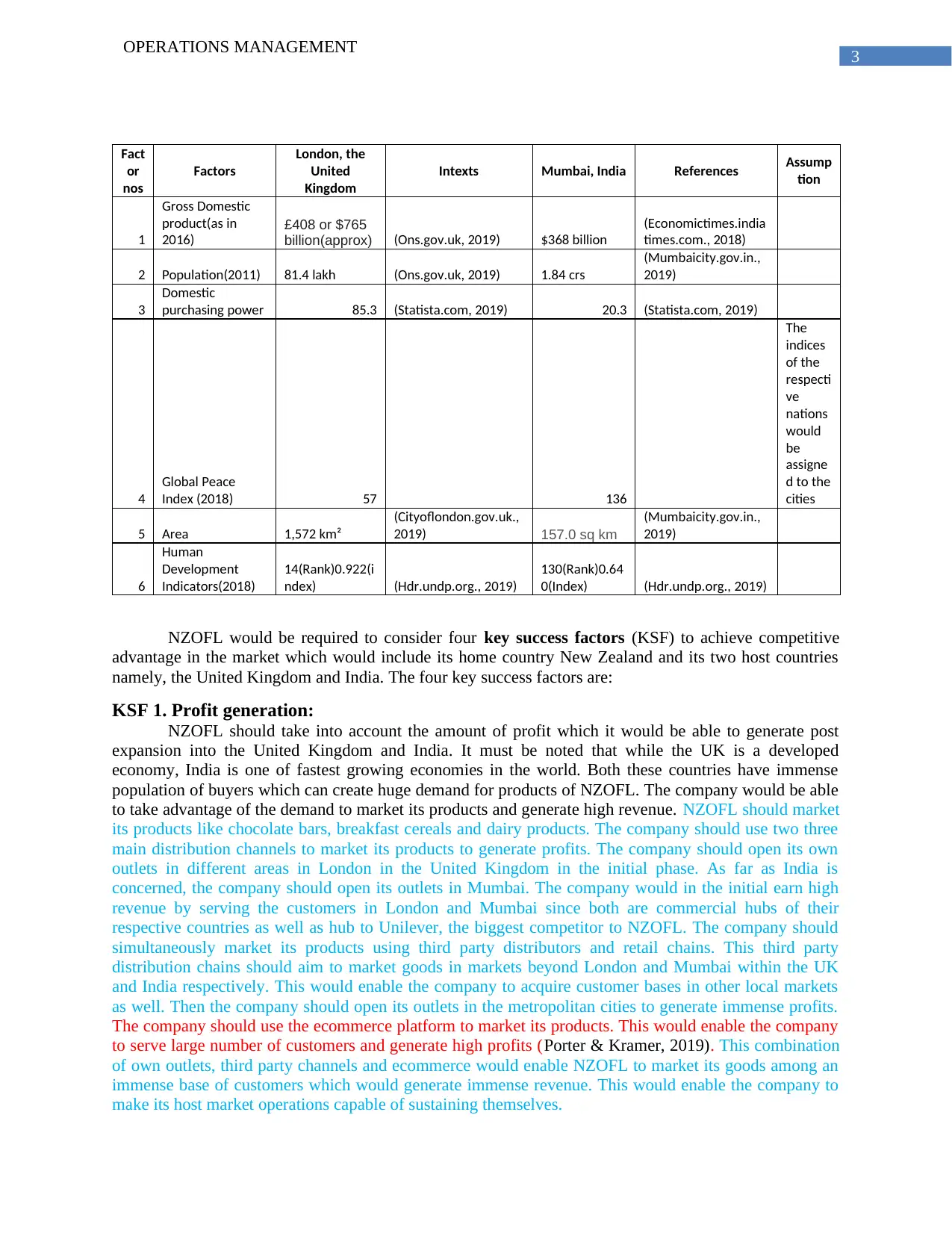
3
OPERATIONS MANAGEMENT
Fact
or
nos
Factors
London, the
United
Kingdom
Intexts Mumbai, India References Assump
tion
1
Gross Domestic
product(as in
2016)
£408 or $765
billion(approx) (Ons.gov.uk, 2019) $368 billion
(Economictimes.india
times.com., 2018)
2 Population(2011) 81.4 lakh (Ons.gov.uk, 2019) 1.84 crs
(Mumbaicity.gov.in.,
2019)
3
Domestic
purchasing power 85.3 (Statista.com, 2019) 20.3 (Statista.com, 2019)
4
Global Peace
Index (2018) 57 136
The
indices
of the
respecti
ve
nations
would
be
assigne
d to the
cities
5 Area 1,572 km²
(Cityoflondon.gov.uk.,
2019) 157.0 sq km
(Mumbaicity.gov.in.,
2019)
6
Human
Development
Indicators(2018)
14(Rank)0.922(i
ndex) (Hdr.undp.org., 2019)
130(Rank)0.64
0(Index) (Hdr.undp.org., 2019)
NZOFL would be required to consider four key success factors (KSF) to achieve competitive
advantage in the market which would include its home country New Zealand and its two host countries
namely, the United Kingdom and India. The four key success factors are:
KSF 1. Profit generation:
NZOFL should take into account the amount of profit which it would be able to generate post
expansion into the United Kingdom and India. It must be noted that while the UK is a developed
economy, India is one of fastest growing economies in the world. Both these countries have immense
population of buyers which can create huge demand for products of NZOFL. The company would be able
to take advantage of the demand to market its products and generate high revenue. NZOFL should market
its products like chocolate bars, breakfast cereals and dairy products. The company should use two three
main distribution channels to market its products to generate profits. The company should open its own
outlets in different areas in London in the United Kingdom in the initial phase. As far as India is
concerned, the company should open its outlets in Mumbai. The company would in the initial earn high
revenue by serving the customers in London and Mumbai since both are commercial hubs of their
respective countries as well as hub to Unilever, the biggest competitor to NZOFL. The company should
simultaneously market its products using third party distributors and retail chains. This third party
distribution chains should aim to market goods in markets beyond London and Mumbai within the UK
and India respectively. This would enable the company to acquire customer bases in other local markets
as well. Then the company should open its outlets in the metropolitan cities to generate immense profits.
The company should use the ecommerce platform to market its products. This would enable the company
to serve large number of customers and generate high profits (Porter & Kramer, 2019). This combination
of own outlets, third party channels and ecommerce would enable NZOFL to market its goods among an
immense base of customers which would generate immense revenue. This would enable the company to
make its host market operations capable of sustaining themselves.
OPERATIONS MANAGEMENT
Fact
or
nos
Factors
London, the
United
Kingdom
Intexts Mumbai, India References Assump
tion
1
Gross Domestic
product(as in
2016)
£408 or $765
billion(approx) (Ons.gov.uk, 2019) $368 billion
(Economictimes.india
times.com., 2018)
2 Population(2011) 81.4 lakh (Ons.gov.uk, 2019) 1.84 crs
(Mumbaicity.gov.in.,
2019)
3
Domestic
purchasing power 85.3 (Statista.com, 2019) 20.3 (Statista.com, 2019)
4
Global Peace
Index (2018) 57 136
The
indices
of the
respecti
ve
nations
would
be
assigne
d to the
cities
5 Area 1,572 km²
(Cityoflondon.gov.uk.,
2019) 157.0 sq km
(Mumbaicity.gov.in.,
2019)
6
Human
Development
Indicators(2018)
14(Rank)0.922(i
ndex) (Hdr.undp.org., 2019)
130(Rank)0.64
0(Index) (Hdr.undp.org., 2019)
NZOFL would be required to consider four key success factors (KSF) to achieve competitive
advantage in the market which would include its home country New Zealand and its two host countries
namely, the United Kingdom and India. The four key success factors are:
KSF 1. Profit generation:
NZOFL should take into account the amount of profit which it would be able to generate post
expansion into the United Kingdom and India. It must be noted that while the UK is a developed
economy, India is one of fastest growing economies in the world. Both these countries have immense
population of buyers which can create huge demand for products of NZOFL. The company would be able
to take advantage of the demand to market its products and generate high revenue. NZOFL should market
its products like chocolate bars, breakfast cereals and dairy products. The company should use two three
main distribution channels to market its products to generate profits. The company should open its own
outlets in different areas in London in the United Kingdom in the initial phase. As far as India is
concerned, the company should open its outlets in Mumbai. The company would in the initial earn high
revenue by serving the customers in London and Mumbai since both are commercial hubs of their
respective countries as well as hub to Unilever, the biggest competitor to NZOFL. The company should
simultaneously market its products using third party distributors and retail chains. This third party
distribution chains should aim to market goods in markets beyond London and Mumbai within the UK
and India respectively. This would enable the company to acquire customer bases in other local markets
as well. Then the company should open its outlets in the metropolitan cities to generate immense profits.
The company should use the ecommerce platform to market its products. This would enable the company
to serve large number of customers and generate high profits (Porter & Kramer, 2019). This combination
of own outlets, third party channels and ecommerce would enable NZOFL to market its goods among an
immense base of customers which would generate immense revenue. This would enable the company to
make its host market operations capable of sustaining themselves.
Paraphrase This Document
Need a fresh take? Get an instant paraphrase of this document with our AI Paraphraser
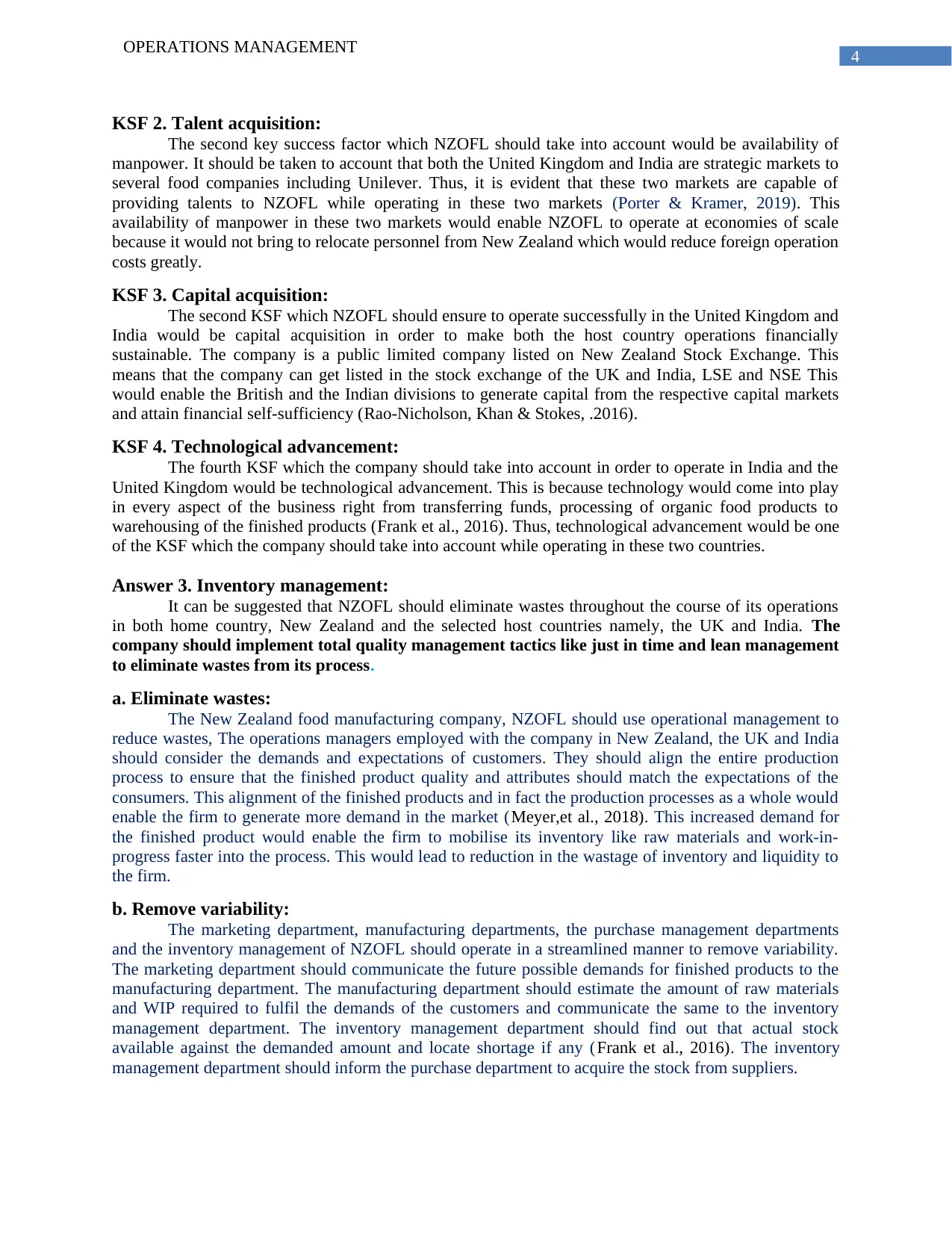
4
OPERATIONS MANAGEMENT
KSF 2. Talent acquisition:
The second key success factor which NZOFL should take into account would be availability of
manpower. It should be taken to account that both the United Kingdom and India are strategic markets to
several food companies including Unilever. Thus, it is evident that these two markets are capable of
providing talents to NZOFL while operating in these two markets (Porter & Kramer, 2019). This
availability of manpower in these two markets would enable NZOFL to operate at economies of scale
because it would not bring to relocate personnel from New Zealand which would reduce foreign operation
costs greatly.
KSF 3. Capital acquisition:
The second KSF which NZOFL should ensure to operate successfully in the United Kingdom and
India would be capital acquisition in order to make both the host country operations financially
sustainable. The company is a public limited company listed on New Zealand Stock Exchange. This
means that the company can get listed in the stock exchange of the UK and India, LSE and NSE This
would enable the British and the Indian divisions to generate capital from the respective capital markets
and attain financial self-sufficiency (Rao-Nicholson, Khan & Stokes, .2016).
KSF 4. Technological advancement:
The fourth KSF which the company should take into account in order to operate in India and the
United Kingdom would be technological advancement. This is because technology would come into play
in every aspect of the business right from transferring funds, processing of organic food products to
warehousing of the finished products (Frank et al., 2016). Thus, technological advancement would be one
of the KSF which the company should take into account while operating in these two countries.
Answer 3. Inventory management:
It can be suggested that NZOFL should eliminate wastes throughout the course of its operations
in both home country, New Zealand and the selected host countries namely, the UK and India. The
company should implement total quality management tactics like just in time and lean management
to eliminate wastes from its process.
a. Eliminate wastes:
The New Zealand food manufacturing company, NZOFL should use operational management to
reduce wastes, The operations managers employed with the company in New Zealand, the UK and India
should consider the demands and expectations of customers. They should align the entire production
process to ensure that the finished product quality and attributes should match the expectations of the
consumers. This alignment of the finished products and in fact the production processes as a whole would
enable the firm to generate more demand in the market (Meyer,et al., 2018). This increased demand for
the finished product would enable the firm to mobilise its inventory like raw materials and work-in-
progress faster into the process. This would lead to reduction in the wastage of inventory and liquidity to
the firm.
b. Remove variability:
The marketing department, manufacturing departments, the purchase management departments
and the inventory management of NZOFL should operate in a streamlined manner to remove variability.
The marketing department should communicate the future possible demands for finished products to the
manufacturing department. The manufacturing department should estimate the amount of raw materials
and WIP required to fulfil the demands of the customers and communicate the same to the inventory
management department. The inventory management department should find out that actual stock
available against the demanded amount and locate shortage if any (Frank et al., 2016). The inventory
management department should inform the purchase department to acquire the stock from suppliers.
OPERATIONS MANAGEMENT
KSF 2. Talent acquisition:
The second key success factor which NZOFL should take into account would be availability of
manpower. It should be taken to account that both the United Kingdom and India are strategic markets to
several food companies including Unilever. Thus, it is evident that these two markets are capable of
providing talents to NZOFL while operating in these two markets (Porter & Kramer, 2019). This
availability of manpower in these two markets would enable NZOFL to operate at economies of scale
because it would not bring to relocate personnel from New Zealand which would reduce foreign operation
costs greatly.
KSF 3. Capital acquisition:
The second KSF which NZOFL should ensure to operate successfully in the United Kingdom and
India would be capital acquisition in order to make both the host country operations financially
sustainable. The company is a public limited company listed on New Zealand Stock Exchange. This
means that the company can get listed in the stock exchange of the UK and India, LSE and NSE This
would enable the British and the Indian divisions to generate capital from the respective capital markets
and attain financial self-sufficiency (Rao-Nicholson, Khan & Stokes, .2016).
KSF 4. Technological advancement:
The fourth KSF which the company should take into account in order to operate in India and the
United Kingdom would be technological advancement. This is because technology would come into play
in every aspect of the business right from transferring funds, processing of organic food products to
warehousing of the finished products (Frank et al., 2016). Thus, technological advancement would be one
of the KSF which the company should take into account while operating in these two countries.
Answer 3. Inventory management:
It can be suggested that NZOFL should eliminate wastes throughout the course of its operations
in both home country, New Zealand and the selected host countries namely, the UK and India. The
company should implement total quality management tactics like just in time and lean management
to eliminate wastes from its process.
a. Eliminate wastes:
The New Zealand food manufacturing company, NZOFL should use operational management to
reduce wastes, The operations managers employed with the company in New Zealand, the UK and India
should consider the demands and expectations of customers. They should align the entire production
process to ensure that the finished product quality and attributes should match the expectations of the
consumers. This alignment of the finished products and in fact the production processes as a whole would
enable the firm to generate more demand in the market (Meyer,et al., 2018). This increased demand for
the finished product would enable the firm to mobilise its inventory like raw materials and work-in-
progress faster into the process. This would lead to reduction in the wastage of inventory and liquidity to
the firm.
b. Remove variability:
The marketing department, manufacturing departments, the purchase management departments
and the inventory management of NZOFL should operate in a streamlined manner to remove variability.
The marketing department should communicate the future possible demands for finished products to the
manufacturing department. The manufacturing department should estimate the amount of raw materials
and WIP required to fulfil the demands of the customers and communicate the same to the inventory
management department. The inventory management department should find out that actual stock
available against the demanded amount and locate shortage if any (Frank et al., 2016). The inventory
management department should inform the purchase department to acquire the stock from suppliers.
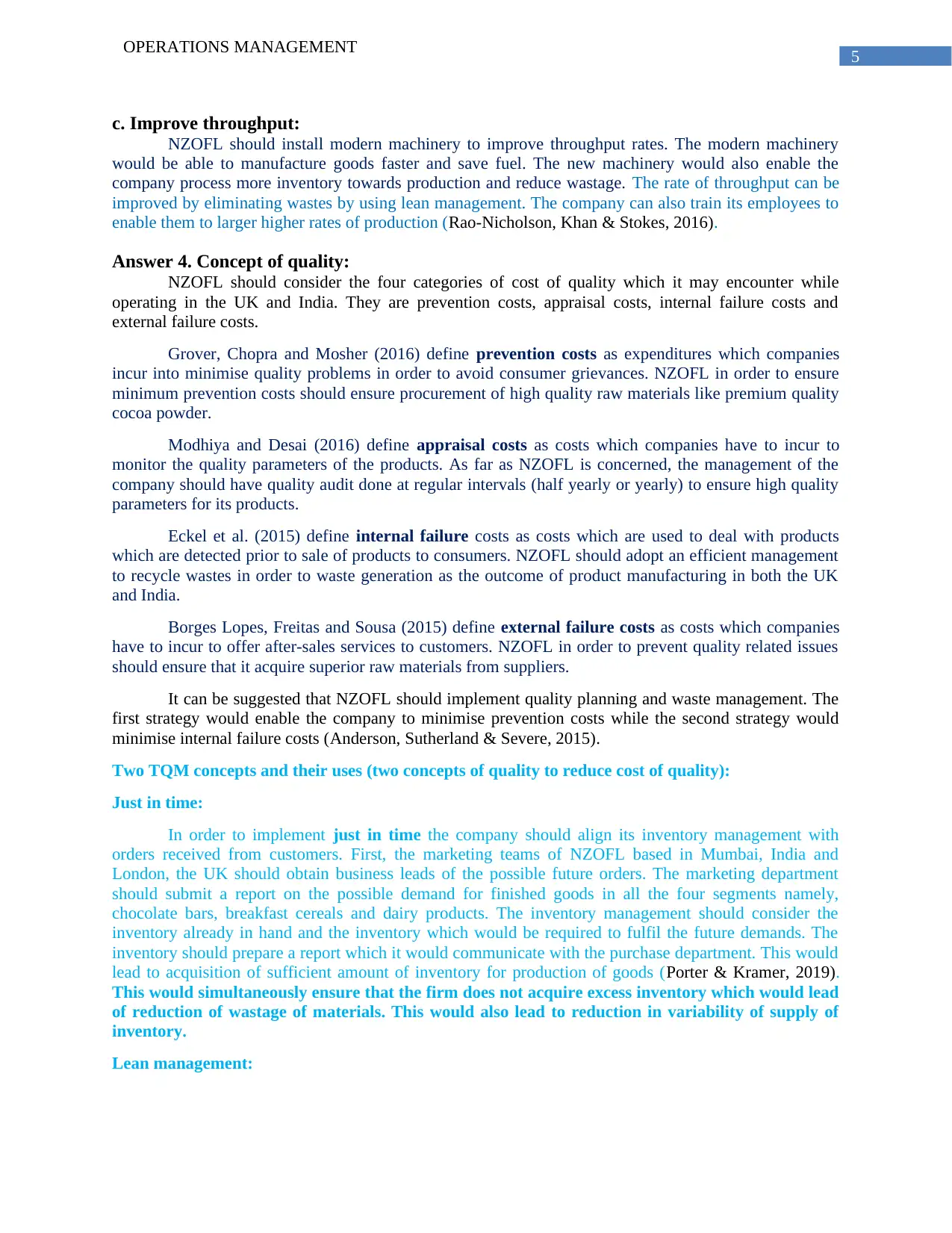
5
OPERATIONS MANAGEMENT
c. Improve throughput:
NZOFL should install modern machinery to improve throughput rates. The modern machinery
would be able to manufacture goods faster and save fuel. The new machinery would also enable the
company process more inventory towards production and reduce wastage. The rate of throughput can be
improved by eliminating wastes by using lean management. The company can also train its employees to
enable them to larger higher rates of production (Rao-Nicholson, Khan & Stokes, 2016).
Answer 4. Concept of quality:
NZOFL should consider the four categories of cost of quality which it may encounter while
operating in the UK and India. They are prevention costs, appraisal costs, internal failure costs and
external failure costs.
Grover, Chopra and Mosher (2016) define prevention costs as expenditures which companies
incur into minimise quality problems in order to avoid consumer grievances. NZOFL in order to ensure
minimum prevention costs should ensure procurement of high quality raw materials like premium quality
cocoa powder.
Modhiya and Desai (2016) define appraisal costs as costs which companies have to incur to
monitor the quality parameters of the products. As far as NZOFL is concerned, the management of the
company should have quality audit done at regular intervals (half yearly or yearly) to ensure high quality
parameters for its products.
Eckel et al. (2015) define internal failure costs as costs which are used to deal with products
which are detected prior to sale of products to consumers. NZOFL should adopt an efficient management
to recycle wastes in order to waste generation as the outcome of product manufacturing in both the UK
and India.
Borges Lopes, Freitas and Sousa (2015) define external failure costs as costs which companies
have to incur to offer after-sales services to customers. NZOFL in order to prevent quality related issues
should ensure that it acquire superior raw materials from suppliers.
It can be suggested that NZOFL should implement quality planning and waste management. The
first strategy would enable the company to minimise prevention costs while the second strategy would
minimise internal failure costs (Anderson, Sutherland & Severe, 2015).
Two TQM concepts and their uses (two concepts of quality to reduce cost of quality):
Just in time:
In order to implement just in time the company should align its inventory management with
orders received from customers. First, the marketing teams of NZOFL based in Mumbai, India and
London, the UK should obtain business leads of the possible future orders. The marketing department
should submit a report on the possible demand for finished goods in all the four segments namely,
chocolate bars, breakfast cereals and dairy products. The inventory management should consider the
inventory already in hand and the inventory which would be required to fulfil the future demands. The
inventory should prepare a report which it would communicate with the purchase department. This would
lead to acquisition of sufficient amount of inventory for production of goods (Porter & Kramer, 2019).
This would simultaneously ensure that the firm does not acquire excess inventory which would lead
of reduction of wastage of materials. This would also lead to reduction in variability of supply of
inventory.
Lean management:
OPERATIONS MANAGEMENT
c. Improve throughput:
NZOFL should install modern machinery to improve throughput rates. The modern machinery
would be able to manufacture goods faster and save fuel. The new machinery would also enable the
company process more inventory towards production and reduce wastage. The rate of throughput can be
improved by eliminating wastes by using lean management. The company can also train its employees to
enable them to larger higher rates of production (Rao-Nicholson, Khan & Stokes, 2016).
Answer 4. Concept of quality:
NZOFL should consider the four categories of cost of quality which it may encounter while
operating in the UK and India. They are prevention costs, appraisal costs, internal failure costs and
external failure costs.
Grover, Chopra and Mosher (2016) define prevention costs as expenditures which companies
incur into minimise quality problems in order to avoid consumer grievances. NZOFL in order to ensure
minimum prevention costs should ensure procurement of high quality raw materials like premium quality
cocoa powder.
Modhiya and Desai (2016) define appraisal costs as costs which companies have to incur to
monitor the quality parameters of the products. As far as NZOFL is concerned, the management of the
company should have quality audit done at regular intervals (half yearly or yearly) to ensure high quality
parameters for its products.
Eckel et al. (2015) define internal failure costs as costs which are used to deal with products
which are detected prior to sale of products to consumers. NZOFL should adopt an efficient management
to recycle wastes in order to waste generation as the outcome of product manufacturing in both the UK
and India.
Borges Lopes, Freitas and Sousa (2015) define external failure costs as costs which companies
have to incur to offer after-sales services to customers. NZOFL in order to prevent quality related issues
should ensure that it acquire superior raw materials from suppliers.
It can be suggested that NZOFL should implement quality planning and waste management. The
first strategy would enable the company to minimise prevention costs while the second strategy would
minimise internal failure costs (Anderson, Sutherland & Severe, 2015).
Two TQM concepts and their uses (two concepts of quality to reduce cost of quality):
Just in time:
In order to implement just in time the company should align its inventory management with
orders received from customers. First, the marketing teams of NZOFL based in Mumbai, India and
London, the UK should obtain business leads of the possible future orders. The marketing department
should submit a report on the possible demand for finished goods in all the four segments namely,
chocolate bars, breakfast cereals and dairy products. The inventory management should consider the
inventory already in hand and the inventory which would be required to fulfil the future demands. The
inventory should prepare a report which it would communicate with the purchase department. This would
lead to acquisition of sufficient amount of inventory for production of goods (Porter & Kramer, 2019).
This would simultaneously ensure that the firm does not acquire excess inventory which would lead
of reduction of wastage of materials. This would also lead to reduction in variability of supply of
inventory.
Lean management:
⊘ This is a preview!⊘
Do you want full access?
Subscribe today to unlock all pages.

Trusted by 1+ million students worldwide
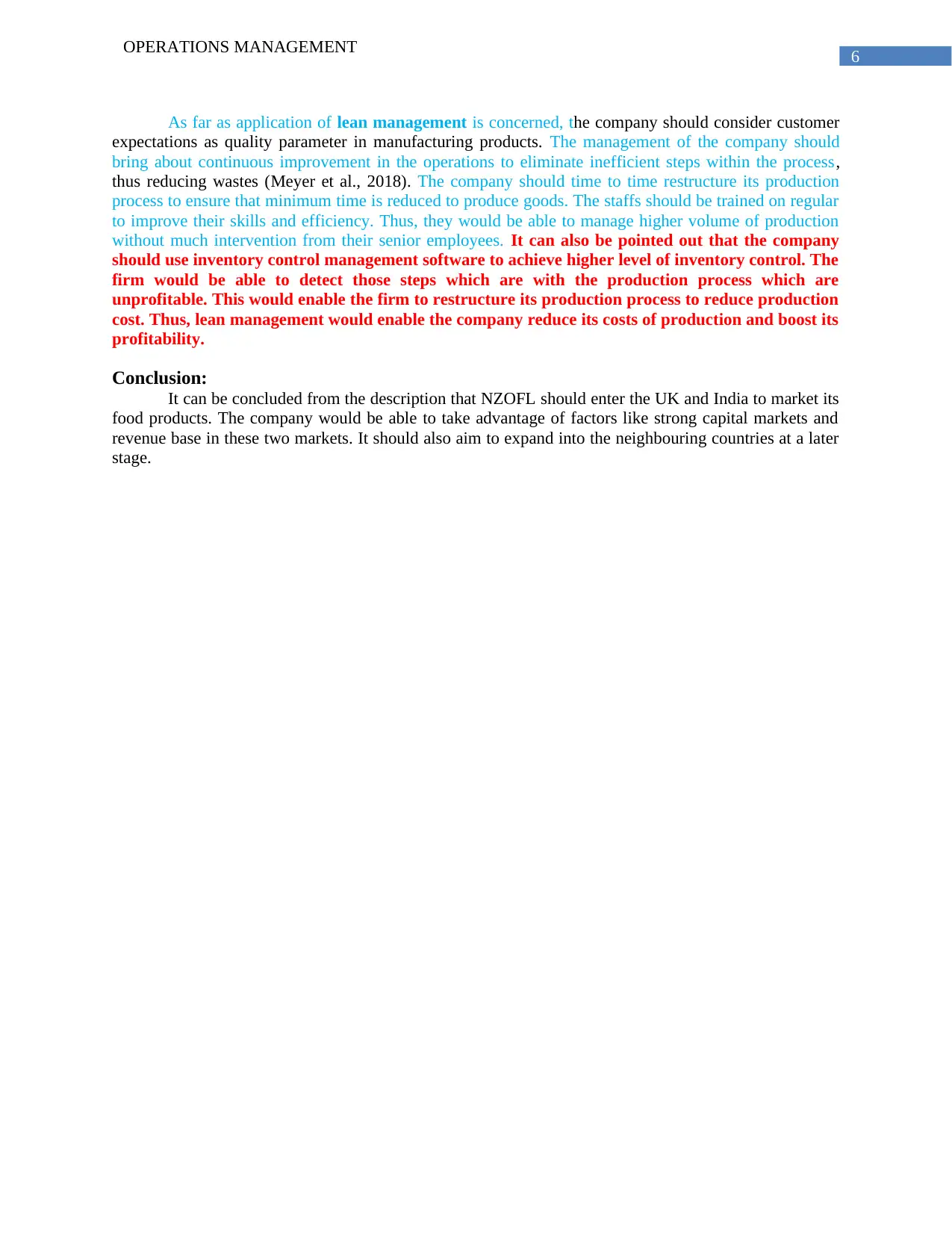
6
OPERATIONS MANAGEMENT
As far as application of lean management is concerned, the company should consider customer
expectations as quality parameter in manufacturing products. The management of the company should
bring about continuous improvement in the operations to eliminate inefficient steps within the process,
thus reducing wastes (Meyer et al., 2018). The company should time to time restructure its production
process to ensure that minimum time is reduced to produce goods. The staffs should be trained on regular
to improve their skills and efficiency. Thus, they would be able to manage higher volume of production
without much intervention from their senior employees. It can also be pointed out that the company
should use inventory control management software to achieve higher level of inventory control. The
firm would be able to detect those steps which are with the production process which are
unprofitable. This would enable the firm to restructure its production process to reduce production
cost. Thus, lean management would enable the company reduce its costs of production and boost its
profitability.
Conclusion:
It can be concluded from the description that NZOFL should enter the UK and India to market its
food products. The company would be able to take advantage of factors like strong capital markets and
revenue base in these two markets. It should also aim to expand into the neighbouring countries at a later
stage.
OPERATIONS MANAGEMENT
As far as application of lean management is concerned, the company should consider customer
expectations as quality parameter in manufacturing products. The management of the company should
bring about continuous improvement in the operations to eliminate inefficient steps within the process,
thus reducing wastes (Meyer et al., 2018). The company should time to time restructure its production
process to ensure that minimum time is reduced to produce goods. The staffs should be trained on regular
to improve their skills and efficiency. Thus, they would be able to manage higher volume of production
without much intervention from their senior employees. It can also be pointed out that the company
should use inventory control management software to achieve higher level of inventory control. The
firm would be able to detect those steps which are with the production process which are
unprofitable. This would enable the firm to restructure its production process to reduce production
cost. Thus, lean management would enable the company reduce its costs of production and boost its
profitability.
Conclusion:
It can be concluded from the description that NZOFL should enter the UK and India to market its
food products. The company would be able to take advantage of factors like strong capital markets and
revenue base in these two markets. It should also aim to expand into the neighbouring countries at a later
stage.
Paraphrase This Document
Need a fresh take? Get an instant paraphrase of this document with our AI Paraphraser
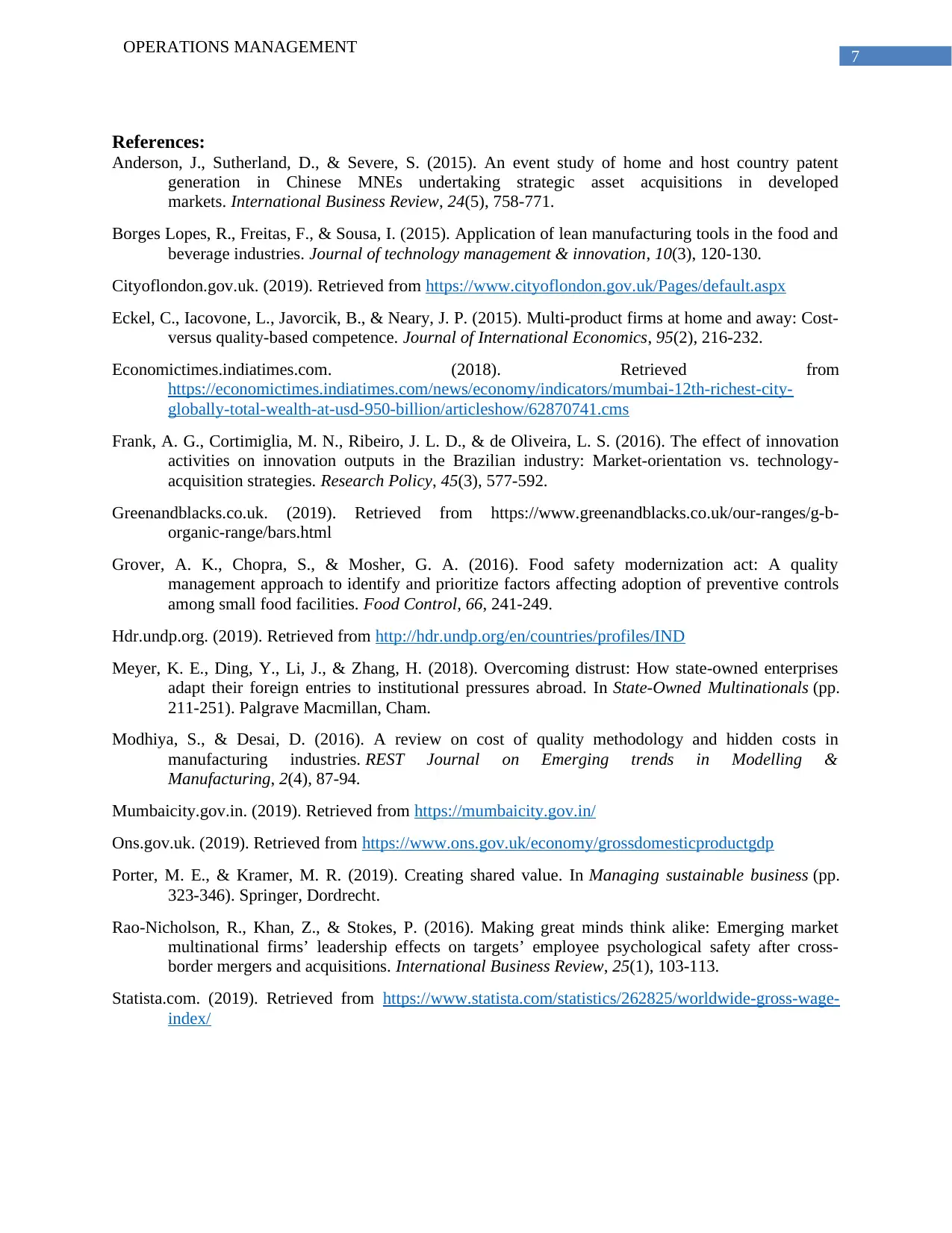
7
OPERATIONS MANAGEMENT
References:
Anderson, J., Sutherland, D., & Severe, S. (2015). An event study of home and host country patent
generation in Chinese MNEs undertaking strategic asset acquisitions in developed
markets. International Business Review, 24(5), 758-771.
Borges Lopes, R., Freitas, F., & Sousa, I. (2015). Application of lean manufacturing tools in the food and
beverage industries. Journal of technology management & innovation, 10(3), 120-130.
Cityoflondon.gov.uk. (2019). Retrieved from https://www.cityoflondon.gov.uk/Pages/default.aspx
Eckel, C., Iacovone, L., Javorcik, B., & Neary, J. P. (2015). Multi-product firms at home and away: Cost-
versus quality-based competence. Journal of International Economics, 95(2), 216-232.
Economictimes.indiatimes.com. (2018). Retrieved from
https://economictimes.indiatimes.com/news/economy/indicators/mumbai-12th-richest-city-
globally-total-wealth-at-usd-950-billion/articleshow/62870741.cms
Frank, A. G., Cortimiglia, M. N., Ribeiro, J. L. D., & de Oliveira, L. S. (2016). The effect of innovation
activities on innovation outputs in the Brazilian industry: Market-orientation vs. technology-
acquisition strategies. Research Policy, 45(3), 577-592.
Greenandblacks.co.uk. (2019). Retrieved from https://www.greenandblacks.co.uk/our-ranges/g-b-
organic-range/bars.html
Grover, A. K., Chopra, S., & Mosher, G. A. (2016). Food safety modernization act: A quality
management approach to identify and prioritize factors affecting adoption of preventive controls
among small food facilities. Food Control, 66, 241-249.
Hdr.undp.org. (2019). Retrieved from http://hdr.undp.org/en/countries/profiles/IND
Meyer, K. E., Ding, Y., Li, J., & Zhang, H. (2018). Overcoming distrust: How state-owned enterprises
adapt their foreign entries to institutional pressures abroad. In State-Owned Multinationals (pp.
211-251). Palgrave Macmillan, Cham.
Modhiya, S., & Desai, D. (2016). A review on cost of quality methodology and hidden costs in
manufacturing industries. REST Journal on Emerging trends in Modelling &
Manufacturing, 2(4), 87-94.
Mumbaicity.gov.in. (2019). Retrieved from https://mumbaicity.gov.in/
Ons.gov.uk. (2019). Retrieved from https://www.ons.gov.uk/economy/grossdomesticproductgdp
Porter, M. E., & Kramer, M. R. (2019). Creating shared value. In Managing sustainable business (pp.
323-346). Springer, Dordrecht.
Rao-Nicholson, R., Khan, Z., & Stokes, P. (2016). Making great minds think alike: Emerging market
multinational firms’ leadership effects on targets’ employee psychological safety after cross-
border mergers and acquisitions. International Business Review, 25(1), 103-113.
Statista.com. (2019). Retrieved from https://www.statista.com/statistics/262825/worldwide-gross-wage-
index/
OPERATIONS MANAGEMENT
References:
Anderson, J., Sutherland, D., & Severe, S. (2015). An event study of home and host country patent
generation in Chinese MNEs undertaking strategic asset acquisitions in developed
markets. International Business Review, 24(5), 758-771.
Borges Lopes, R., Freitas, F., & Sousa, I. (2015). Application of lean manufacturing tools in the food and
beverage industries. Journal of technology management & innovation, 10(3), 120-130.
Cityoflondon.gov.uk. (2019). Retrieved from https://www.cityoflondon.gov.uk/Pages/default.aspx
Eckel, C., Iacovone, L., Javorcik, B., & Neary, J. P. (2015). Multi-product firms at home and away: Cost-
versus quality-based competence. Journal of International Economics, 95(2), 216-232.
Economictimes.indiatimes.com. (2018). Retrieved from
https://economictimes.indiatimes.com/news/economy/indicators/mumbai-12th-richest-city-
globally-total-wealth-at-usd-950-billion/articleshow/62870741.cms
Frank, A. G., Cortimiglia, M. N., Ribeiro, J. L. D., & de Oliveira, L. S. (2016). The effect of innovation
activities on innovation outputs in the Brazilian industry: Market-orientation vs. technology-
acquisition strategies. Research Policy, 45(3), 577-592.
Greenandblacks.co.uk. (2019). Retrieved from https://www.greenandblacks.co.uk/our-ranges/g-b-
organic-range/bars.html
Grover, A. K., Chopra, S., & Mosher, G. A. (2016). Food safety modernization act: A quality
management approach to identify and prioritize factors affecting adoption of preventive controls
among small food facilities. Food Control, 66, 241-249.
Hdr.undp.org. (2019). Retrieved from http://hdr.undp.org/en/countries/profiles/IND
Meyer, K. E., Ding, Y., Li, J., & Zhang, H. (2018). Overcoming distrust: How state-owned enterprises
adapt their foreign entries to institutional pressures abroad. In State-Owned Multinationals (pp.
211-251). Palgrave Macmillan, Cham.
Modhiya, S., & Desai, D. (2016). A review on cost of quality methodology and hidden costs in
manufacturing industries. REST Journal on Emerging trends in Modelling &
Manufacturing, 2(4), 87-94.
Mumbaicity.gov.in. (2019). Retrieved from https://mumbaicity.gov.in/
Ons.gov.uk. (2019). Retrieved from https://www.ons.gov.uk/economy/grossdomesticproductgdp
Porter, M. E., & Kramer, M. R. (2019). Creating shared value. In Managing sustainable business (pp.
323-346). Springer, Dordrecht.
Rao-Nicholson, R., Khan, Z., & Stokes, P. (2016). Making great minds think alike: Emerging market
multinational firms’ leadership effects on targets’ employee psychological safety after cross-
border mergers and acquisitions. International Business Review, 25(1), 103-113.
Statista.com. (2019). Retrieved from https://www.statista.com/statistics/262825/worldwide-gross-wage-
index/
1 out of 8
Related Documents
Your All-in-One AI-Powered Toolkit for Academic Success.
+13062052269
info@desklib.com
Available 24*7 on WhatsApp / Email
![[object Object]](/_next/static/media/star-bottom.7253800d.svg)
Unlock your academic potential
Copyright © 2020–2026 A2Z Services. All Rights Reserved. Developed and managed by ZUCOL.





